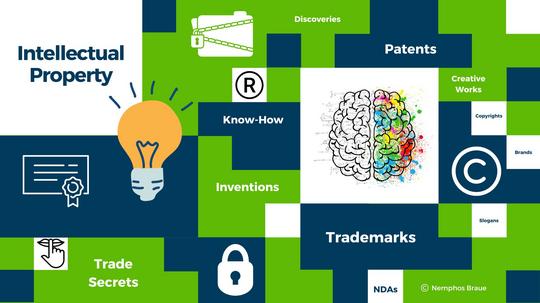
Entrepreneurs generally have at least one thing in common: They have more things to do than time to do them. As such, getting things done is a matter of prioritization, but what metrics does the entrepreneur use to prioritize their tasks?
Two common metrics are urgency and importance. In theory, tasks that are both urgent and important get done first, followed by urgent or important, and lastly tasks that are neither, but still must get done.
One of the tasks that actually falls into the urgent and important category, but may not always get placed there by entrepreneurs, is protecting the intellectual property (IP) of the business. In many ways, your IP is a substantial aspect of your overall business, so IP satisfies the importance metric.
Protecting IP is also an urgent matter, because, unbeknownst to many entrepreneurs, some IP rights (IPR) can be lost if not protected before you begin using your IP to build your business.
What are the different types of IP in a business?
Most IP can be divided into a few basic types, and together, represent significant assets for your business.
- Know-how.
- Brands.
- Creative works.
- Inventions and discoveries.
Generally speaking, know-how is how you do what you do and, as such, represents a substantial asset of your business. It includes confidential information that your business possesses about your customers and vendors, how you price your goods and services, etc. Unlike the other types of IP, know-how is possessed by every or nearly every business.
Brands are how you distinguish your goods and services from your competitors. Therefore, it is important to select brands that are not similar to your competitors and not merely descriptive of your goods and services. Brands are also how your customers come to identify your business and the goods and services your business provides. Due to this identification, brands tend to hold the goodwill that you generate with your customers. As such, your brands can represent a substantial asset of your business.
A creative work may be expressed in any tangible form — written, audio, video, etc. — and may actually be the goods or services being sold by the business or works that are intended to help the business sell its goods and services, such as websites. As you might expect, particularly when the creative works are the goods and services being sold by the business, creative works can be a substantial asset of the company.
Inventions and discoveries are generally in the form of new or improved goods and services, ways of providing the goods and services or operating the business that provide your company with a competitive advantage relative to your competitors. They are often trade secrets of the business.
How and when do I protect my IP?
For all forms of know-how, the answer is contracts. A business looking to protect its know-how needs to enter into contracts requiring anyone involved with the business, namely employees, vendors and sometimes customers, to protect confidential information by not disclosing it to the public. With employees, the contracts should also require that an employee transfer know-how developed by the employee to the business. This is particularly important for employees that are hired to generate IP, such as engineers, developers and marketers.
Trademark rights in a brand come into existence the moment a business labels goods and services with a brand to identify itself as the source. Those trademark rights, known as common law rights, provide some protection in those regions where the goods and services are sold.

Trademark registrations provide a business with more rights and a broader scope of protection than common law rights. In addition, the cost of filing an application to register a trademark is usually very reasonable in most states and countries of interest, particularly when compared to the cost of rebranding if someone else registers a similar mark.
Time is of the essence when it comes to applying for a trademark registration. In the U.S., if your business is the first to use a trademark to label goods and services that are sold, then your business will often have superior rights to other businesses. However, if another business is the first to file a U.S. trademark application for a similar mark, then the other business may also accrue rights in their marks that can conflict with and diminish your trademark rights.
Copyrights in a creative work come into existence the moment the creative work is reduced to a tangible form, such as written works, audio and video recordings. Those copyrights, known as common law rights, may provide some protection, but, in the U.S. and other countries, a copyright registration is required to enforce your copyrights against an entity using your creative work without permission, i.e., an infringer.
Deciding on whether to protect inventions and discoveries as a trade secret or with a patent depends upon various factors, one important factor being whether or not it will be disclosed in the delivery of your goods and services to the public. If you want protection for your invention or discovery with a patent, then you will need to file a patent application before your invention or discovery is disclosed to the public.
Whether in technology, health care, consulting, retail or any industry, intellectual property can represent a significant portion of your business’ assets. Speaking with an IP attorney can help you check off the urgent and important task of protecting your IP before it’s too late.
Looking for legal expertise? Our attorneys left the largest firms in the world to practice the law differently and are committed to driving legal and business value for clients by fostering true strategic partnerships. Have a question about protecting your intellectual property? Contact Nemphos Braue to learn more.
George Nemphos and Tim Braue started Nemphos Braue LLC in 2016, combining big firm expertise with the flexibility and creativity of a boutique practice. From venture capital and private equity to intellectual property, mergers and acquisitions and general corporate counsel, Nemphos Braue is a different kind of law firm.
A U.S. registered patent attorney with more than 20 years of experience, Michael Antone serves as of counsel at Nemphos Braue, where he helps clients protect their most valuable intellectual property assets. He also has experience in corporate and business law, private equity and as a professional engineer.

